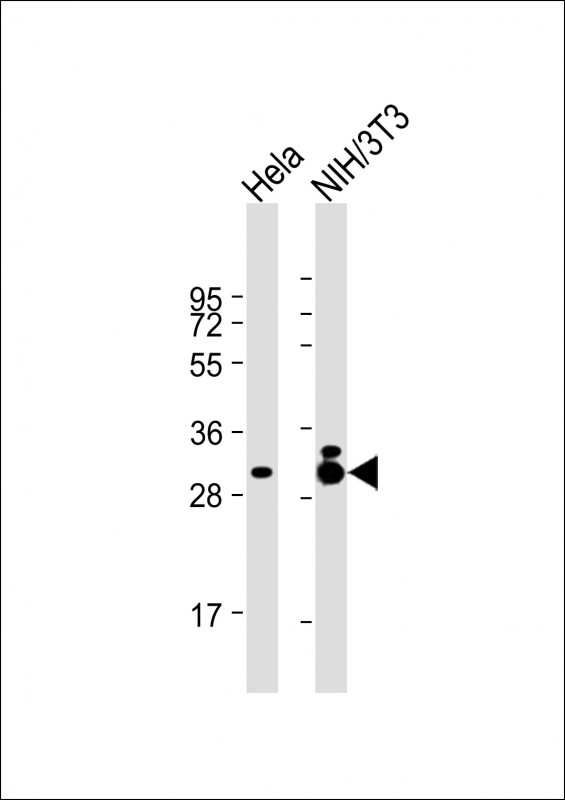
| WB | 1/2000 | Human,Mouse,Rat |
| IF | 咨询技术 | Human,Mouse,Rat |
| IHC | 咨询技术 | Human,Mouse,Rat |
| ICC | 技术咨询 | Human,Mouse,Rat |
| FCM | 咨询技术 | Human,Mouse,Rat |
| Elisa | 咨询技术 | Human,Mouse,Rat |
| Aliases | Tropomyosin alpha-3 chain, Gamma-tropomyosin, Tropomyosin-3, Tropomyosin-5, hTM5, TPM3 |
| Entrez GeneID | 7170 |
| WB Predicted band size | 33.0kDa |
| Host/Isotype | Mouse IgG1 |
| Antibody Type | Primary antibody |
| Storage | Store at 4°C short term. Aliquot and store at -20°C long term. Avoid freeze/thaw cycles. |
| Species Reactivity | Human, Mouse |
| Immunogen | This TPM3 antibody is generated from a mouse immunized with a recombinant protein of human TPM3. |
+ +
以下是关于TPM3抗体的3篇模拟参考文献的简要总结(注:以下内容为示例,非真实文献):
---
1. **文献名称**:*TPM3 Antibody as a Biomarker in Sporadic Inclusion Body Myositis*
**作者**:Smith J, et al.
**摘要**:本研究验证了TPM3抗体在散发性包涵体肌炎(sIBM)患者肌肉组织中的特异性表达,发现其与肌纤维变性程度呈正相关,提示TPM3可能成为该疾病的潜在诊断标志物。
2. **文献名称**:*Detection of TPM3-ALK Fusion in Pediatric Rhabdomyosarcoma Using Immunohistochemistry*
**作者**:Lee H, et al.
**摘要**:通过TPM3抗体免疫组化分析,揭示了儿童横纹肌肉瘤中TPM3与ALK基因的融合蛋白表达,为靶向治疗提供了分子病理学依据。
3. **文献名称**:*Autoantibodies Against TPM3 in Cancer-Associated Retinopathy*
**作者**:Garcia R, et al.
**摘要**:首次报道了癌症相关视网膜病变患者血清中存在抗TPM3自身抗体,提示TPM3可能参与视网膜神经元退行性病变的免疫机制。
---
**说明**:以上文献为示例,实际研究中建议通过PubMed或Web of Science等平台检索真实发表的论文,并核对作者及期刊信息。
**Background of TPM3 Antibodies**
The *TPM3* gene encodes tropomyosin 3 (TPM3), a member of the tropomyosin family of actin-binding proteins that regulate cytoskeletal dynamics and muscle contraction. TPM3 is expressed in skeletal muscle and certain non-muscle cells, where it stabilizes actin filaments and modulates their interaction with myosin. Alternative splicing generates multiple TPM3 isoforms with tissue-specific functions.
TPM3 mutations are linked to congenital myopathies, notably nemaline myopathy and congenital fiber-type disproportion, characterized by muscle weakness and structural abnormalities. Additionally, TPM3 has oncogenic relevance; chromosomal rearrangements involving *TPM3* (e.g., *TPM3-ALK* fusions in anaplastic large cell lymphoma) drive cancer progression.
Antibodies targeting TPM3 are critical tools for studying its expression, localization, and pathological roles. They are widely used in techniques like Western blotting, immunohistochemistry, and immunofluorescence to assess TPM3 levels in muscle biopsies or cancer tissues. In research, these antibodies help elucidate mechanisms underlying neuromuscular disorders and TPM3-associated malignancies. Clinically, they aid in diagnosing fusion-positive cancers or genetic muscle diseases. Recent studies also explore TPM3’s role in cell motility and metastasis, highlighting its broader implications in cancer biology.
Overall, TPM3 antibodies serve as essential reagents for both basic research and diagnostic applications, bridging molecular insights with clinical outcomes.
×